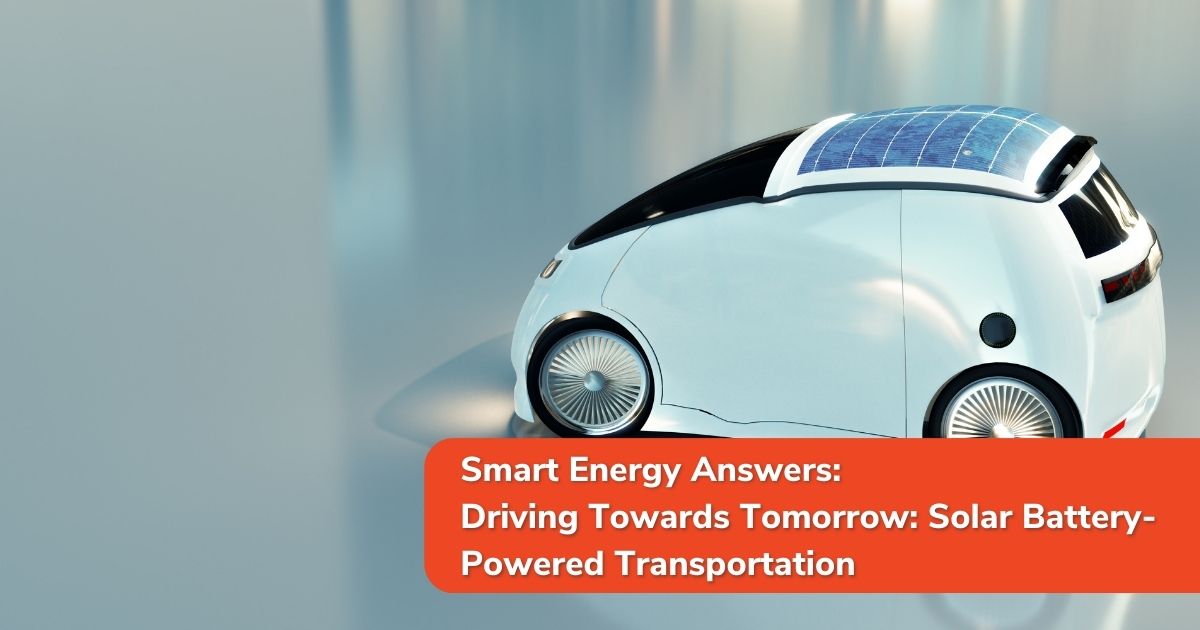Driving Towards Tomorrow: Solar Battery-Powered Transportation

Explore the innovative use of solar batteries in revolutionising transportation towards a more sustainable future.
Importance of sustainable energy solutions in mitigating environmental impact and promoting energy independence
Sustainable energy solutions play a crucial role in mitigating the environmental impact of transportation and promoting energy independence. By harnessing renewable energy sources such as solar power, we can significantly reduce greenhouse gas emissions and dependence on fossil fuels.
Using solar batteries to power electric vehicles (EVs) is a prime example of a sustainable energy solution. Solar energy is clean, abundant, and can be harnessed with minimal environmental impact. By utilising solar batteries, EVs can operate without relying solely on the electricity grid, reducing carbon emissions and promoting energy independence.
Explanation of how solar batteries power vehicles and extend their range
Solar batteries power vehicles by converting sunlight into electricity. Photovoltaic cells within the solar panels absorb photons from sunlight, which then generate an electric current. This current is stored in the solar battery, which can be used to power the EV's motor and other electrical components.
Solar batteries also have the capability to extend the range of electric vehicles. By continuously charging the battery during daylight hours, EVs can operate for longer periods without needing to rely on grid electricity. This extended range makes EVs more practical and convenient for daily commuting and long-distance travel.
Importance of reliable energy storage for enhancing the efficiency and sustainability of transportation systems
Reliable energy storage is crucial for enhancing the efficiency and sustainability of transportation systems. Solar batteries provide a reliable and efficient means of storing solar energy for later use. By storing excess energy generated during daylight hours, solar batteries ensure a continuous power supply for EVs even during periods of low sunlight or at night.
This reliable energy storage system not only increases the overall efficiency of transportation systems but also reduces reliance on the electricity grid. By utilizing solar batteries, EVs can operate independently, reducing strain on the grid and enhancing the overall sustainability of transportation.
Analysis of advancements in solar panel efficiency and vehicle integration
Advancements in solar panel efficiency have significantly contributed to the integration of solar power in vehicles. Over the years, the efficiency of solar panels has greatly improved, allowing for the generation of more electricity from a smaller surface area.
This increased efficiency has enabled the integration of solar panels into various parts of electric vehicles, such as the roof, hood, or even the body. By maximizing the surface area available for solar panels, EVs can generate more solar energy and increase their overall range and efficiency.
Overview of solar-assisted charging systems for electric vehicles
Solar-assisted charging systems for electric vehicles utilize solar energy to supplement grid electricity for charging. These systems typically consist of solar panels installed on charging stations or carports, which generate electricity to charge the EV's battery.
By incorporating solar-assisted charging systems, EV owners can reduce their reliance on the electricity grid and further decrease their carbon footprint. Additionally, these systems provide an opportunity for EV owners to utilize clean, renewable energy for charging, regardless of the availability of grid electricity.
Analysis of pilot projects and initiatives implementing solar-powered public transportation
Pilot projects and initiatives implementing solar-powered public transportation have shown promising results in terms of reducing carbon emissions and promoting sustainable mobility. Many cities around the world have introduced solar-powered buses and trams, utilising solar panels installed on the vehicle's roof to generate electricity for propulsion and other systems.
These initiatives not only reduce the environmental impact of public transportation but also showcase the feasibility and benefits of solar-powered transportation. By analysing the success and challenges of these pilot projects, we can gain valuable insights into the implementation and scalability of solar-powered public transportation systems.
Importance of solar-powered commercial vehicles in reducing operating costs and carbon emissions for businesses
Solar-powered commercial vehicles offer significant benefits to businesses, including reduced operating costs and carbon emissions. By integrating solar panels on the roofs of delivery trucks, vans, or other commercial vehicles, businesses can generate electricity to power the vehicle's operations.
This solar power not only reduces the reliance on fossil fuels but also lowers operating costs by decreasing the need for grid electricity or fuel. Additionally, solar-powered commercial vehicles contribute to a greener brand image, attracting environmentally conscious customers.
Scaling up infrastructure for solar-powered transportation, including charging stations and energy storage systems
To fully realize the potential of solar-powered transportation, it is essential to scale up the infrastructure, including charging stations and energy storage systems. Increasing the number of charging stations equipped with solar panels enables more EV owners to access clean and renewable energy for charging.
Furthermore, expanding the capacity of energy storage systems ensures a reliable and continuous supply of solar power for transportation. By investing in the infrastructure required for solar-powered transportation, we can accelerate the transition to a more sustainable and efficient mobility system.
Assessment of market trends and consumer demand for solar-powered transportation solutions
Market trends and consumer demand play a crucial role in shaping the future of solar-powered transportation. As awareness of climate change and environmental issues grows, there is an increasing demand for sustainable transportation solutions.
Assessing market trends and consumer demand helps identify the potential for growth in solar-powered transportation and enables stakeholders to tailor their offerings to meet the needs of consumers. By understanding the market dynamics, we can foster innovation and collaboration to drive the adoption of solar-powered transportation solutions.
Emphasis on the transformative potential of solar battery technology in driving the transition to a cleaner, more sustainable transportation future and call to action
Solar battery technology has the transformative potential to drive the transition to a cleaner and more sustainable transportation future. By harnessing the power of the sun, we can reduce our dependence on fossil fuels, mitigate climate change, and improve air quality.
To fully realize this potential, it is crucial for governments, businesses, and individuals to take action. Governments can incentivize the adoption of solar-powered transportation through policies and regulations. Businesses can invest in solar infrastructure and integrate solar-powered vehicles into their fleets. Individuals can choose solar-powered transportation options and advocate for sustainable mobility.
By collectively embracing solar battery technology, we can create a future where transportation is powered by clean and renewable energy, ensuring a sustainable planet for generations to come.
%20(1).png?width=265&height=96&name=www.smartenergyanswers.com.auhs-fshubfsSmart%20Energy%20Answers%20Logo%20(HIRES)%20(1).png)

.png?width=514&height=121&name=Tesla%20Powerwall%203%20(new).png)







